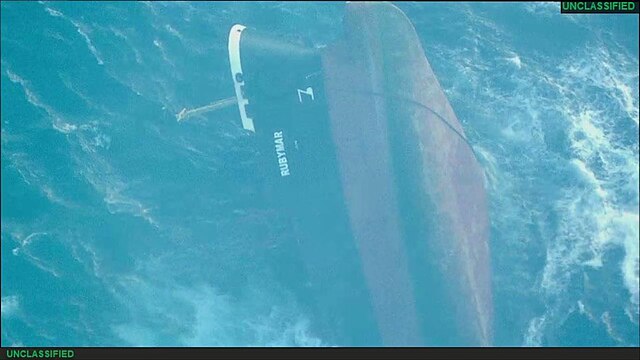On February 24, the U.S. military announced that a Houthi attack on the Rubymar, a British-registered, Lebanese-operated cargo vessel, has caused an 18-mile oil slick in the Red Sea. The vessel was transporting more than 41,000 tons of fertilizer, which has also prompted warnings of environmental danger.
Regional sources report on the environmental and political impacts:
Al Arabiya outlined the February 18 attack on the Rubymar, a Belize-flagged, British-registered, and Lebanese-operated cargo vessel. Of the missiles fired by the Houthis, one “hit the side of the ship, causing water to enter the engine room and its stern to sag,” and “a second missile hit the vessel’s deck without causing major damage.”
The ship was “abandoned in the Gulf of Aden” and “has left a huge oil slick, in an environmental disaster that US Central Command said Friday could get worse,” according to The Times of Israel. The ship remains anchored and is “slowly taking on water,” with a low but present risk of sinking.
Al Jazeera cited reports that “the vessel was transporting more than 41,000 tonnes of fertiliser when attacked,” with U.S. CENTCOM warning that the cargo “could spill into the Red Sea and worsen this environmental disaster.” CENTCOM further criticized the Houthis for continually disregarding “the regional impact of their indiscriminate attacks, threatening the fishing industry, coastal communities, and imports of food supplies.”
Environmental expert Sammy Kayed was quoted by The National: “A fertiliser spill would cause a rapid nutrient increase, which means it gives a lot of food or nutrition for algae to bloom rapidly and this will disrupt the balance of marine ecosystems. And then you’d have oxygen depletion, where the algae breaks down and consumes a lot of oxygen and leads to very low dissolved oxygen levels, which leads to dead zones where aquatic life can’t survive.”
On February 26, the ship’s chartering broker stated that “The owner of the Rubymar cargo ship… is looking at towing the vessel to Saudi Arabia once a leak can be fixed.” The Jerusalem Post directly quoted the next steps proposed by Roy Koury, CEO of Lebanon-based Blue Fleet Group, which will include an “attempt” at closing the small fuel leakage so that the ship can be transported by tow.
Houthi leader Mohammed Ali Al-Houthi alternatively suggested on X: “The sinking British ship might be hauled in return for delivering aid vehicles to Gaza.” Arab News continued: “Yemen’s Houthi militia has pledged to prevent the rescue of a leaking UK-linked ship in the Red Sea before humanitarian aid can reach Gaza, raising concerns that they would use the ship as leverage.”
Asharq Al-Awsat provided insights into the rationale for recent Houthi operations in the Red Sea: “Since November, the militias have repeatedly targeted ships in the Red Sea and surrounding waters. They claim to be acting over Israel’s war targeting Hamas in the Gaza Strip, however they have frequently targeted vessels with tenuous or no clear links to Israel, imperiling shipping in a key route for trade among Asia, the Mideast and Europe.”
On February 24, U.S. and UK coalition forces carried out airstrikes on Houthi targets in eight locations in Yemen “to further disrupt and degrade the capabilities of the Iranian-backed Houthi militia to conduct their destabilizing and reckless attacks against U.S. and international vessels lawfully transiting the Red Sea, the Bab AI-Mandeb Strait, and the Gulf of Aden.” Andalou Ajansi noted: “With tensions escalating due to joint strikes by the US and UK against Houthi targets in Yemen, the group declared that it considered all American and British ships legitimate military targets.”
